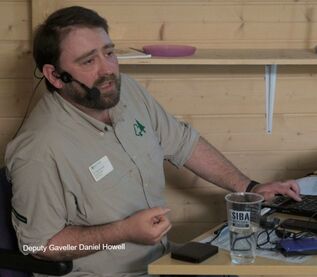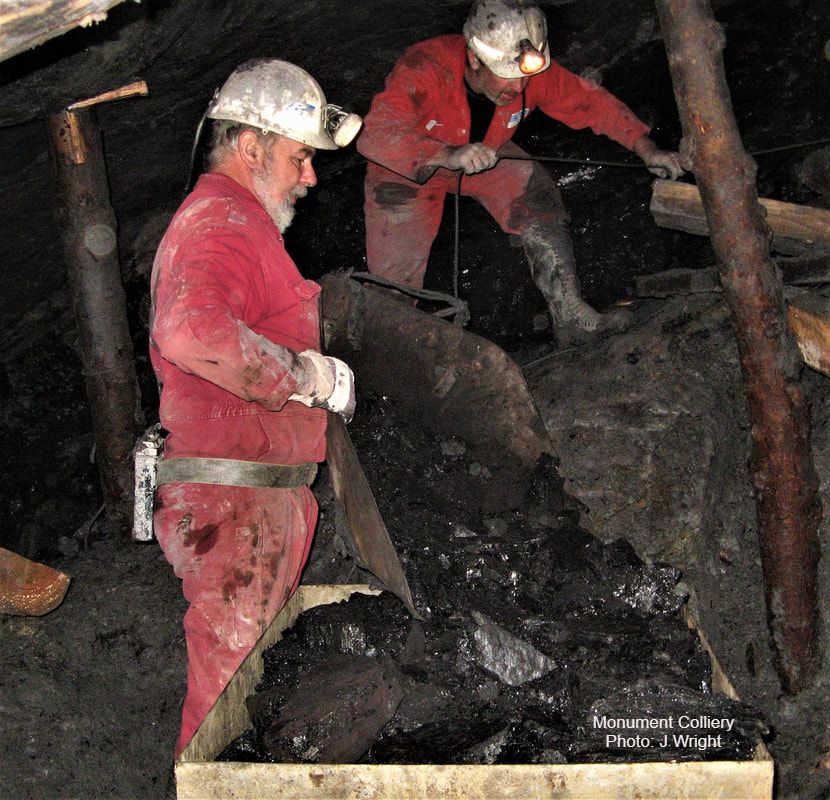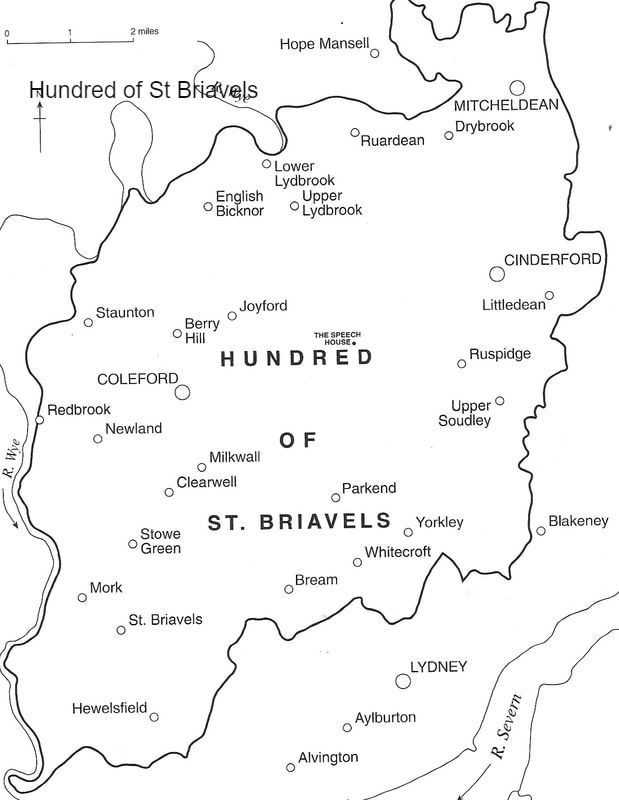|
Gales and galees.
A gale is the area in which a Freeminer has the right to work for coal, iron ore or stone. The holder of a gale is called a galee. Gales are mapped sub-surface land areas throughout the Forest of Dean and Hundred of St Briavels. A gale is exclusively claimed by a registered Freeminer and granted by the Crown (Forestry Commission). Since 1838 with the passing of the Dean Forest Mines Act, once granted, a gale can subsequently be owned by a non Freeminer through sale, gift, will etc. Subsequent owners of a gale, whether they are registered or not, continue to have the Freeminer's right to mine that gale. Gales are worked for specified minerals but other minerals found in the gale may be mined at an improved royalty to the Crown. Since 1838 the boundaries and extent of gales have been clearly defined by the Award of Mines 1841, 1st and 2nd schedules and marked physically by gale stones on the surface. The Deputy Gaveller is an experienced mine surveyor and holds maps or plans of all gales. He is responsible for their administration, including creation, splitting and amalgamation and issuing of gales. The Deputy Gaveller ensures the application of legal duties by gale owners, observance of rules and regulations made in the Award of mines 1841 and particularly the collection of dead rents or royalties. A galee holds the property in fee simple, subject to the Dean Forest Mines Acts. Contemporary Freemining. The Coal Act 1938 and Coal Industry Nationalisation Act 1946 both gave specific exemption for this unique local privilege to continue intact. 52 mainly large colliery gales, were subsequently purchased by the National Coal Board (NCB) who became galees and paid a royalty to the Freeminer Trustees of the Deep Gales, until just before the last deep mine closed in 1965. After Coal Nationalisation in 1947, small Freemines continued to operate alongside the NCB, some obtained 36(2a) licenses to work outcrop NCB owned coal, or holding an NCB 'bare licence' having no cost or conditions attached, so they could register with the NCB, to be able to sell coal through NCB collieries, or small coal to power stations. Some Freemines remained unlicensed as they only sold directly to the local market. As the larger deep mines closed, many ex-NCB colliers took up their right to register as a Freeminer, obtaining their own gales, to continue mining. More recently, with the passing of the Coal Industry Act 1994, legislation changed in relation to licensing in the Forest of Dean coal field, there have been many discussions about how licensing under the Act should apply. There is now a special license issued for coal gales, under Part II of the 1994 Act for the Forest of Dean and exception was made in conjunction with the Forestry Commission, as to how the licensing applies. Part 40 of the 1994 Act adds: 40 (4) Nothing in section 38 above shall confer any entitlement to withdraw support in connection with the working of any coal or coal mines comprised in land in the Forest of Dean or any other part of the area of what was the Hundred of Saint Briavels in the county of Gloucester, being land in respect of which the privileges of free miners are exercisable. |

To register as a Freeminer, a miner must satisfy four legal requirements:
Registration. Once a person has fulfilled the correct qualifications, they can apply to be entered into the Freeminer registration book kept by the Deputy Gaveller; a blue registration strip with their number is issued to the miner. There are over 4,300 Freeminers registered since the 1840’s. Once registered, a Freeminer can claim gales from the Crown (if not already granted) and can make applications for other gales that are available. When granted, the Freeminer becomes the owner of that gale and can work the minerals defined in it. A royalty is paid to the Crown annually for each ton of mineral raised, otherwise a minimum ‘dead rent’ or "composition" is paid if the gale is less productive, or idle. The ‘dead rent’ or ‘composition’ is equivalent to a royalty on an agreed minimum tonnage output (since 1838, paid in lieu of the Crown's right to put in the 'fifth man' and take a profit share from the mine - the extra person was the 'King's Man' or 'Fifth Man' - traditionally there were four partners in a mine). Today.
A Freemine is worked according to the Dean Forest Mines Acts, the Mines Regulations 2014, as well as modern Health and Safety and Environmental laws, where applicable. Freemines are worked full time, part time, evenings, or just a day on the weekend. They offer full time incomes, or a useful supplement to the household income, or even as a personal interest. There is great satisfaction working for yourself or in a small group, solving challenges, making every day different. Trainees absorb the tradition through working alongside experienced Freeminers. The hard work, with on the job training, can be satisfying and a productive experience. The Freeminers' Association works closely with the Forestry Commission, and recently worked with the Heritage Lottery Scheme through the Forester's Forest to keep Freemining a living tradition, a distinctly unique part of the Forest of Dean. 
|
